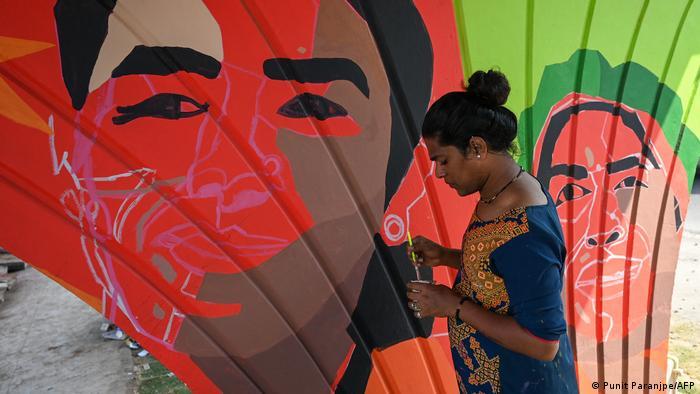India's Transgender Community Wants More Access to Surgery

In India, projects like this set of public murals by transgender artists are helping to change attitudes and fight discrimination
Pratiba Kumari is a transgender person from Delhi who has been saving for three years to undergo hormone replacement therapy and sex reassignment surgery, also known as gender affirmation surgery..
However, Kumari has encountered many obstacles along the way.
"The sheer cost of the process has made me look at government hospitals but there is little help. The environment is unfriendly and funds are a big obstacle," Kumari told DW.
Kumari is one of thousands of transgender people in India who find it tough to access surgery because government hospitals are not responsive, and private hospitals are often too expensive.
"Many of us are struggling. Government hospitals fail to offer a sensitive approach to the process and give us the runaround," Kumari said.
In 2014, India's Supreme Court recognized a third gender for the first time, paving the way for millions of transgender people to attain legal status, better social protection and jobs.
In 2011, the Indian election commission also decided to allow transgender people to vote in general elections as a separate group.
But despite the ruling and even after courts overturned a British-era law in 2018, that criminalized same-sex relationships, social and legal discrimination against transgender people is still widespread in India.
Those in the community say there is still a long way to social acceptance, especially in the medical sector.
"Many trans-persons undergo gender distress caused by not having your body match your gender identity. But such surgeries are expensive and only few state governments like Chhattisgarh and Tamil Nadu have been helpful," Reena Rai, who organizes transgender beauty pageants in India, told DW.
Rai has been working for the empowerment of transgender women for several years, seeking to create a transphobic-free India and educate families.
"We don't put any stress on any of them when they compete in our pageants. But I can see that many of them want to undergo surgery and many times it is beyond their reach," adds Rai.
Accessing surgery is difficult
In India, sex reassignment surgery can cost up to $7,600 (€7,500) depending on which part of the country it is carried out in.
Some hospitals perform the procedure for a lower price. Metropolitan cities like Mumbai and Delhi are expensive, while in smaller cities the costs for such a procedure are more affordable.
According to the Transgender Persons (Protection of Rights) Act, 2019, the government is mandated to provide health facilities to transgender persons, including separate HIV surveillance centers and gender affirmation surgery.
The act also states that the government must provide hormone therapy and counselling, both before and after the surgery.
"Just passing an act with provisions is not enough. It is not enabling and a vast majority of trans people are struggling. They continue to be abandoned and discriminated," Shaine Soni, a former transgender beauty queen told DW.
Earlier this year, the government extended the benefits of its flagship healthcare insurance scheme, Ayushman Bharat, to transgender people under a new scheme that includes support for gender affirmation therapy.
A complicated procedure
However, many transgender people complain that the process is cumbersome as it entails registering with a portal to receive a nationally recognized "transgender certificate" and an identity card that permits such surgeries.
Only a few thousand people have been provided with the certification.
"Just look at the number of people who were given such cards. Over 90% of transgender people in this country are poor, uneducated and struggle," Manisha, a transgender woman, who has been trying to get a certificate, told DW.
"This bureaucratic red tape only adds to their woes," she added.
India's National Human Rights Commission said in a report that many transgender people do not possess identity cards, voter cards or bank accounts because of "limited education, lack of awareness and poor exposure to the social, political and legal system."
The Commission also noted that the financial position of many transgender people is precarious and the right to an adequate standard of living is being denied to a large section of this community.
"We have a tough life and there is a battle at every stage. But we will raise our voices so that there is recognition. Healthcare is very important," Navya Singh, a transgender model and actor, told DW.
Experts involved in SRS procedures point out that the entire process is complex and requires sensitive handling, from specialized and lengthy hormone therapy, to the surgery itself, which involves psychological counselling both before and after.
"This is not a procedure which is easy. A lot of preparation is needed. State governments could begin by providing financial assistance to people looking forward to undergoing sex-change operations and easing the documentation complexities," Gopal Yadav, a plastic surgeon, told DW.
Edited by: Wesley Rahn
Get the latest reports & analysis with people's perspective on Protests, movements & deep analytical videos, discussions of the current affairs in your Telegram app. Subscribe to NewsClick's Telegram channel & get Real-Time updates on stories, as they get published on our website.
























